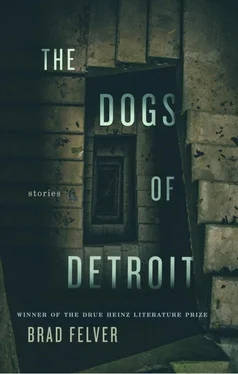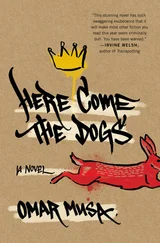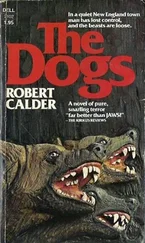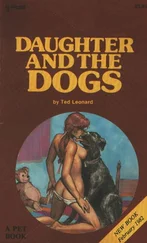They’ll figure it out.
But, she says, we’ll already have their dollar by then. She pauses, scowls at him. Do you want to eat muskrat guts all winter?
The salesmen, legs weary and nearly petrified from the road, pull onto the packed dirt circle drive. They step out, arch their backs, grunt. They are men, all of them, mostly young men, and many are overweight from the long miles spent traveling. They wear ironed shirts and short ties, and their Florsheims are without scuffs.
Most wink at Wiley and Helen, offer their dollars freely when they see the children’s red and shredded feet, and they understand they are making a small donation. Helen sees this soon and feels no guilt. Hold still! she tells Wiley, and she rips apart the shoulder seam from his shirt. She slices his cheek with her fingernail, smears the blood into his dirty face. She tears the bottom hem from her dress, flashing more of her skinny legs. She wipes mule dung on their faces and necks. They are miniature hobos, starved and reeking.
They earn their dollars, and Helen tells Wiley to ignore the sad looks. You do what you must, she says, sounding very old and wise, like the mother. These men offer their dollars, and she sends Wiley off to the small store two miles distant to buy wheat flour and coffee and, once, two strips of bacon, which burns down Wiley’s neck because he eats it so quickly. He wants to vomit it up just to eat it again.
One salesman, younger than the others, with a doughy, fresh face, spends a quarter hour with the roped ring. He slides it back and forth from the rigging to the post, thinking. He carves the air with squiggly lines, as if parsing an equation. He bends the rope over onto itself, tries tying off a Flemish knot. He checks the ring and the rigging and the bit for secret spring-loaded clasps.
It’s impossible, the man says finally.
Wiley looks to Helen, feels his abdomen go cold.
I’ll have my dollar back now.
The children sit still. Helen shakes her head.
The man shouts down at Wiley, Where’s your father?
Dead.
What about your mother?
She’s dead too, says Helen. We live with our uncle who collects swords and cannons, and one time he stabbed a man in the brain for asking a question about sausage gravy.
The man steps toward Helen. Wiley moves between them.
Boy! the man snaps.
Wiley stands still, and when the man takes another step, he latches onto the man’s leg, bites through his wool slacks near his knee and deep into his flesh until he hits bone, drawing out hot blood that stains the creases between his teeth. The man yelps. He hammers down onto Wiley’s skinny neck. Helen runs up and stomps his foot, hard, and the man falls down the porch steps. He slithers on the ground and moans.
He drives off. Wiley wipes the blood from his teeth, feels where one tooth has broken off, and realizes it must still be in the man’s thigh. He rubs on the broken tooth, its rough edge, spits.
Helen smiles at him, guides him to the porch steps where he sits. She inspects his neck, which will blush with purple and yellow overnight. She wraps her arms around his torso. We sure earned that one, she says.
Wiley leans back into her, breathes deeply her scent. He noses into her neck until she stands and backs away.
The long-armed man appears on the horizon that evening, nearly three weeks since the uncle has been gone, when the winter has softened and the snow has melted. He walks slowly, no car or horse, just an ancient, sun-scalded Stetson, knee-high boots, and a Winchester repeater poking from his canvas pack.
His arms dangle low, nearly to his knees when his posture slackens, hang there as if ready to lash fools with, and he looks not unlike an ape. His hands too are massive, his fat fingers long enough to wrap around a telephone pole, it seems to the children. He is not a large man, not six foot, not two hundred pounds, but his gait is lumbering like a silverback. His face is splotchy from the sun and scarred with deep pockmarks, and the children think he has been tortured by nasty men with knives, but the blots are clearly from a bout of smallpox.
The man strides up to the porch, squints at the sign. He says nothing and does not look at the children, does not seem to even notice them. Helen punches Wiley’s shoulder and gestures toward the well, and Wiley scampers off to bring the man a full ladle. He drinks it slowly, making no noise. Wiley stares at the rifle in his pack, at his dangling arms.
When the man speaks, his voice is soft like a child’s, not impolite but lean, fragmentary. That barn free for the night? he says, gesturing.
Wiley looks to Helen, and she nods without thinking. The man removes his hat and walks toward the barn. His steps are short and timid, as if he has gravel in his boots. He disappears into the dark barn.
The mother scolds Wiley for allowing the man to stay. What were you thinking? she says. A strange man when your uncle is gone? And with a gun! Wiley does not defend the decision or argue. He does not claim that it was Helen who invited the man. She is unused to strange faces. Even those of the salesmen driving past seem familiar. But a man with no car or horse is not to be trusted.
Wiley is fascinated. He has not known many men and does not remember much of his father beyond the sweet smell of his chewing tobacco and his rattly laugh that rumbled through the depths of his gullet.
He bets Helen that the long-armed man is an escaped convict from the prison in Wichita.
Then how does he have a gun?
He crushed a man’s skull, Wiley says. A police man. Crushed his skull and stole his gun.
Then why didn’t he steal the car, too?
He thinks for a moment, looks at his dirty bare feet. He doesn’t know how to drive, he says.
Are you kidding me? With those arms? I bet he could drive a car and juggle swords at the same time.
Wiley glares at her. He knows in a backward way that she is the clever one and that this is no time for imagination. But he wants only to impress her.
He stands in the shadow of the barn, peers between siding slats, watches the ape man. He undresses slowly, revealing heavy tattoos notched with matching scars, as if an outline has been carved and then colored. They are long, winding patterns, never crisscrossing, and they unfurl about his shoulder blades, down his arms, wrap around his torso and back, all of them billowing, crawling across his body like long arms reaching for things unseen. They engulf his shoulders in great waves, wrap about his pale torso with no end. And underneath the rippling, tattooed scars there are the pox craters, hundreds of them, dormant and veiled.
The man does not look up but speaks in his slow, lilting drawl: You should bring that mule in before it storms.
Wiley feels like an animal caught in a live trap. He does not move. He has not noticed the sky darkening or the clouds swirling above in a dizzying rush, and the appearance of the ape man excites him more than even the storm.
The man removes his pants, revealing pale white cheeks. His tattoos and scars halt at the waist, as if they are imprinted upon a body sleeve that can be removed.
Quickly now, the man says.
Wiley runs off toward the porch and the mule. He drags the animal away from its leftover shitpile, back toward the barn. He tethers it near the ape man. The mule begins to buck and bray because it feels the looming storm in its bones, and Wiley scratches its snout and its floppy ears until the animal calms.
The clouds burst, explode open with a thunder crack, muddying the dirt barnyard into a vast pool. Helen jumps from the porch and into the deluge, waving her arms and kicking her legs until she tumbles into the mud. She carves mud angels in it, laughs, and she does not feel her skin tighten with the intense cold of the winter rain.
Читать дальше












